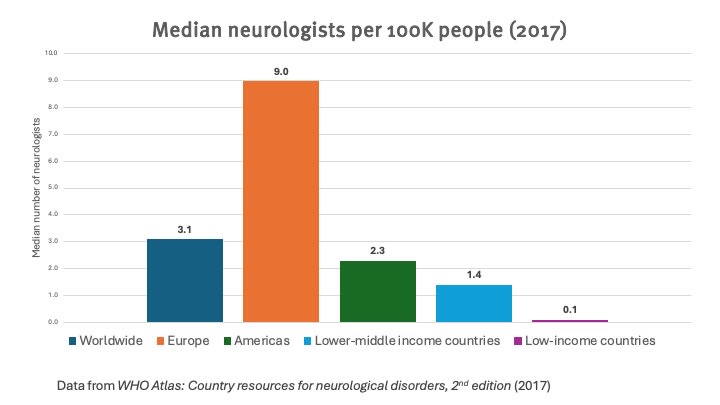Epigraph Vol. 26 Issue 2, Spring 2024
Educating non-specialists in Mexico: New university course offers hybrid experience
By Joy Mazur, Epigraph intern
Cite this article: Mazur J. Educating non-specialists in Mexico: New university course offers hybrid experience. Epigraph 2024; 26(2):25-28.
Primary healthcare providers are essential to people with epilepsy. As a 2023 report notes, their involvement in epilepsy care can translate to early intervention and monitoring, education about the condition, and coordination of care.

However, many primary healthcare providers do not have sufficient training to care for people with epilepsy. This leads to significant diagnosis and treatment gaps, particularly in countries where health care depends largely on primary healthcare professionals.
The World Health Organization Americas region reports a median of 2.3 neurologists per 100,000 people; this compares with 9.0 in Europe and 3.1 worldwide. Globally, low-income countries report a median of 0.1 neurologist per 100,000, and lower-middle income countries report 1.4 (see graphic).
Given the relative lack of neurologists in many Latin American countries, primary healthcare providers manage epilepsy.
Gagandeep Singh, chair of ILAE’s Education Council, said, “The ILAE believes that engagement of the primary health care sector in epilepsy diagnosis, treatment, ongoing care and prevention is one of the best investments in bridging the worldwide epilepsy diagnostic and treatment gaps and quality care improvement.”
Course sparks wide-ranging interest
To address this issue, a new, accredited course in Mexico aims to educate primary healthcare providers about epilepsy through a structured curriculum.

Effective Management of Epilepsy in Primary Health Care Services was launched in February 2023 through the University of Guadalajara. The six-month course follows a hybrid learning model; participants completed coursework through synchronous and asynchronous virtual meetings and had the opportunity to attend an in-person, five-day workshop at the end of the course.
Fridha Villalpando Vargas, an epilepsy researcher and a coordinator of the course, said that a wide range of professionals attended.
“The course attracted neurologists, primary care physicians, neuropsychologists, and even participants with no clinical background, like anthropologists working in marginal and indigenous communities,” she said.
The course is based on the ILAE primary care epilepsy curriculum.
“We tried to think about every single detail before undergoing this endeavor,” said Alioth Guerrero Aranda, clinical neurophysiologist and a coordinator and tutor of the program. “We are very happy with the outcome of the first edition.”
High marks from participants
This course differs from others in the region due to its focus on accessible language and in-person learning. Course materials and sessions are conducted entirely in Spanish. The in-person module includes interactive sessions with clinical case discussion.

Aranda said the in-person component received high praise from participants.
“It allowed them to engage in face-to-face networking,” he said, “and, of course, for strengthening of professional relationships.”
Both Vargas and Aranda are members of ILAE’s Young Epilepsy Section (YES); they recruited other YES members from the Latin American region as faculty members for the course.

“They followed the ILAE curriculum, but also contributed with their experience in the field and using technology tools,” Vargas said.
Faculty members and students from the first iteration of the course have an ongoing group chat on WhatsApp. Vargas said this helps course participants maintain a community and provides a platform for questions or further work in epilepsy.
For other clinicians or researchers looking to replicate the project, Vargas recommended collaborating with an educational institution because of the depth of their experience and infrastructure. The university provided participants and faculty with ample classroom space and transportation around the area for their in-person module. At the end of the course, participants received a diploma accredited through the university to establish their credibility.
“That’s very good motivation for some of the physicians to take the course, even when they’re not a specialist,” Vargas said.
Bureaucratic and financial challenges
However, to collaborate with the university, coordinators had to justify the necessity of the course. The course’s small size—15 students were enrolled—and primary healthcare focus made it a difficult sell, Aranda said.

“From the very moment that you have to convince an academic community of the necessity of doing something like this, that is proof of the lack of recognition of epilepsy as a problem,” he said.
Aranda said that convincing primary healthcare professionals to invest in their education is another challenge, one that requires collaboration with other organizations.
The course cost $10,235, with most funds covering costs for the in-person module, such as lodging, meals, and transportation. The $1,000 registration fee—relatively expensive for primary healthcare professionals in the region—was later reduced to $750, and the coordinators arranged payment plans through the university for course participants.
To help cover costs, faculty voluntarily waived their compensation and paid for their own flights to attend the in-person module. Ultimately, the course turned a profit, generating $11,235. The net revenue will offset the costs of future courses.

Blazing the trail to primary care training
The second iteration of the course was launched in February 2024. Despite challenges, the coordinators consider the course a success and look forward to continuing it.
“In the end, we are blessed with the outcome,” Aranda said. “We believe that this is a new alternative for primary healthcare professionals and we can gradually become more widely known.”
RESOURCES
Course information is available on YouTube: Spanish | English
For more information, please email the course coordinators at epilepsia@cuvalles.udg.mx.
Subscribe to the ILAE Newsletter
To subscribe, please click on the button below.
Please send me information about ILAE activities and other
information of interest to the epilepsy community